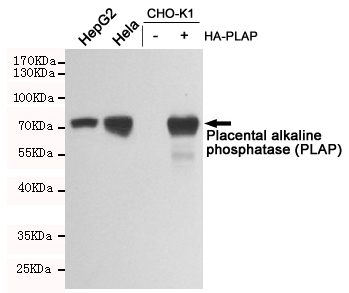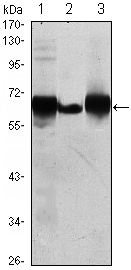Placental alkaline phosphatase (PLAP) mouse mAb
- Catalog No.:YM1349
- Applications:WB
- Reactivity:Human
- Target:
- PLAP
- Fields:
- >>Thiamine metabolism;>>Folate biosynthesis;>>Metabolic pathways;>>Biosynthesis of cofactors
- Gene Name:
- alpp
- Human Gene Id:
- 250
- Human Swiss Prot No:
- P05187
- Immunogen:
- Purified recombinant Placental alkaline phosphatase (PLAP) protein fragments expressed in E.coli.
- Specificity:
- This antibody detects endogenous levels of Placental alkaline phosphatase (PLAP) and does not cross-react with related proteins.
- Formulation:
- Liquid in PBS containing 50% glycerol, 0.5% BSA and 0.02% sodium azide.
- Source:
- Monoclonal, Mouse
- Dilution:
- wb 1:1000
- Purification:
- The antibody was affinity-purified from mouse ascites by affinity-chromatography using epitope-specific immunogen.
- Concentration:
- 1 mg/ml
- Storage Stability:
- -15°C to -25°C/1 year(Do not lower than -25°C)
- Other Name:
- Alkaline phosphatase;Alkaline phosphatase placental;Alkaline phosphatase placental type;Alkaline phosphatase Regan isozyme;ALP;Alp1;ALPP;FLJ61142;Germ-cell alkaline phosphatase;nagao isozyme;OTTHUMP00000164354;PALP;Placental alkaline phosphatase 1;placental heat-stable alkaline phosphatase;placental type;PLAP;PLAP-1;PLAP1;PPB1_HUMAN.
- Observed Band(KD):
- 70kD
- Background:
- The protein encoded by this gene is an alkaline phosphatase, a metalloenzyme that catalyzes the hydrolysis of phosphoric acid monoesters. It belongs to a multigene family composed of four alkaline phosphatase isoenzymes. The enzyme functions as a homodimer and has a catalytic site containing one magnesium and two zinc ions, which are required for its enzymatic function. The protein is primarily expressed in placental and endometrial tissue; however, strong ectopic expression has been detected in ovarian adenocarcinoma, serous cystadenocarcinoma, and other ovarian cancer cells. [provided by RefSeq, Jan 2015],
- Function:
- catalytic activity:A phosphate monoester + H(2)O = an alcohol + phosphate.,cofactor:Binds 1 magnesium ion.,cofactor:Binds 2 zinc ions.,miscellaneous:In most mammals there are four different isozymes: placental, placental-like, intestinal and tissue non-specific (liver/bone/kidney).,online information:Alkaline phosphatase entry,polymorphism:Placental ALP is highly polymorphic, there are at least three common alleles.,similarity:Belongs to the alkaline phosphatase family.,subunit:Homodimer.,
- Subcellular Location:
- Cell membrane; Lipid-anchor, GPI-anchor .
- Expression:
- Detected in placenta (at protein level).
Placenta-derived exosomal miR-135a-5p promotes gestational diabetes mellitus pathogenesis by activating PI3K/AKT signalling pathway via SIRT1. JOURNAL OF CELLULAR AND MOLECULAR MEDICINE Jianying Yan WB Human plasma
- June 19-2018
- WESTERN IMMUNOBLOTTING PROTOCOL
- June 19-2018
- IMMUNOHISTOCHEMISTRY-PARAFFIN PROTOCOL
- June 19-2018
- IMMUNOFLUORESCENCE PROTOCOL
- September 08-2020
- FLOW-CYTOMEYRT-PROTOCOL
- May 20-2022
- Cell-Based ELISA│解您多样本WB检测之困扰
- July 13-2018
- CELL-BASED-ELISA-PROTOCOL-FOR-ACETYL-PROTEIN
- July 13-2018
- CELL-BASED-ELISA-PROTOCOL-FOR-PHOSPHO-PROTEIN
- July 13-2018
- Antibody-FAQs
- Products Images

- Western blot analysis of extracts from HepG2, Hela, CHO-K1 and CHO-K1 transfected pcDNA3.1-HA-PLAP cell lysates using Placental alkaline phosphatase (PLAP) mouse mAb (1:1000 diluted).Predicted band size:70KDa.Observed band size:70KDa.
